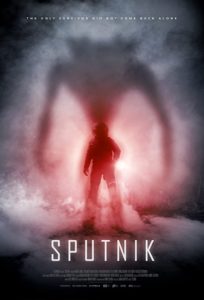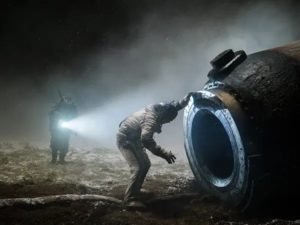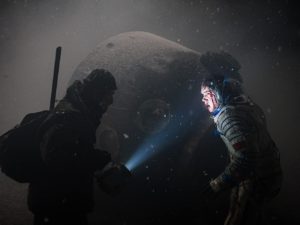Sputnik
The companion
 In recent years, Russian cinema has stood out on the international stage thanks to several very elaborate productions, most of them in science-fiction genre. We can cite “Attraction” (“Prityazhenie”, RUS, 2017), “Invasion” (“Vtorzhenie”, RUS, 2020) and “Avanpost” (RUS, 2019) as examples that are closer to the type of fiction we are used to. These are joined by “Sputnik” ( RUS, 2020), unfairly classified as a “Russian Alien”.
In recent years, Russian cinema has stood out on the international stage thanks to several very elaborate productions, most of them in science-fiction genre. We can cite “Attraction” (“Prityazhenie”, RUS, 2017), “Invasion” (“Vtorzhenie”, RUS, 2020) and “Avanpost” (RUS, 2019) as examples that are closer to the type of fiction we are used to. These are joined by “Sputnik” ( RUS, 2020), unfairly classified as a “Russian Alien”.
The year is 1983, the Cold War is at its height, and between the various fronts, there is fierce space competition between the Soviet Union and the United States. Two Soviet cosmonauts, Kostya Veshnyakov (Pyotr Fyodorov) and Kirill Averchenko (Aleksey Demidov) are returning to ground after completing their mission in Earth orbit.
 What seemed to be just routine leaves them both astonished when they realize that something strange is happening outside the spaceship. The next scene takes place on the ground, when a peasant finds the ship landed, with Averchenko dead and Veshnyakov very shaken.
What seemed to be just routine leaves them both astonished when they realize that something strange is happening outside the spaceship. The next scene takes place on the ground, when a peasant finds the ship landed, with Averchenko dead and Veshnyakov very shaken.
A few days later, renowned psychologist Tatyana Klimova (Oksana Akinshina) is invited by Colonel Semiradov (Fedor Bondarchuk) to accompany him to his base, somewhere in Kazakhstan. All he tells her is that a cosmonaut surviving a space mission suffers from amnesia and needs her help.
 It doesn’t take long to Tatyana realize that the situation is much more complicated than Semiradov had told her. She discovers that the cosmonaut had returned to Earth with an alien parasite inside his body, in a symbiotic relationship where the life of one depended on that of the other. She becomes even more shocked when finding out that the research is being done in the most unethical way possible, and as always with the aim of creating a powerful weapon.
It doesn’t take long to Tatyana realize that the situation is much more complicated than Semiradov had told her. She discovers that the cosmonaut had returned to Earth with an alien parasite inside his body, in a symbiotic relationship where the life of one depended on that of the other. She becomes even more shocked when finding out that the research is being done in the most unethical way possible, and as always with the aim of creating a powerful weapon.
Tatyana and Kostya desperately try to solve the two problems that afflict them, flee the base and separate the cosmonaut from the alien. But for that they will need to face Semiradov, who will not give them a break, and the consequences will be devastating.
 This is not an ordinary science fiction movie. Unlike its American counterparts or even the aforementioned Russians ones, it does not bring super advanced ships, laser swords and other digitally produced wonders. Special effects were used only on the alien, which looks like a cross between a Naja snake and an albino otter. Even so, there is verisimilitude in the story.
This is not an ordinary science fiction movie. Unlike its American counterparts or even the aforementioned Russians ones, it does not bring super advanced ships, laser swords and other digitally produced wonders. Special effects were used only on the alien, which looks like a cross between a Naja snake and an albino otter. Even so, there is verisimilitude in the story.
This is a purebred Russian film. Directed by Egor Abramento, the cast, even small, has a great performance. The reported period, beginning of the 1980s, brings a Soviet Union to its fullest, and the film shows much of the inconsistencies in the way things were conducted. This is a Russian story, set in a recent past that many people have lived through and are still alive to witness.
 I was curious about the film’s title, “Sputnik”, because the only reference I had was the first satellite launched into space in 1957. In fact, Sputnik was a generic term used in ten different satellites launched between 1957 and 1961. But the use of the term in the title refers to its real sense, which is both “satellite” and “traveling companion”, which fully fits the theme of the movie.
I was curious about the film’s title, “Sputnik”, because the only reference I had was the first satellite launched into space in 1957. In fact, Sputnik was a generic term used in ten different satellites launched between 1957 and 1961. But the use of the term in the title refers to its real sense, which is both “satellite” and “traveling companion”, which fully fits the theme of the movie.
Although the film can be seen in its literal narrative, there are several readings that can be done at customer’s taste. One of them is that the symbiosis between the cosmonaut and the alien would be the same between the former Soviet Union and the totalitarian regime, so that one could not survive without the other – as it really happened in the early 1990s!
 Abstractions aside, “Sputnik” is an interesting film, treading through a more sober science-fiction, totally different from “space opera” line. The movie has little or no resemblance to any of the “Alien” series except for the presence of a strong female protagonist. But, the final judgment is up to the viewer.
Abstractions aside, “Sputnik” is an interesting film, treading through a more sober science-fiction, totally different from “space opera” line. The movie has little or no resemblance to any of the “Alien” series except for the presence of a strong female protagonist. But, the final judgment is up to the viewer.






